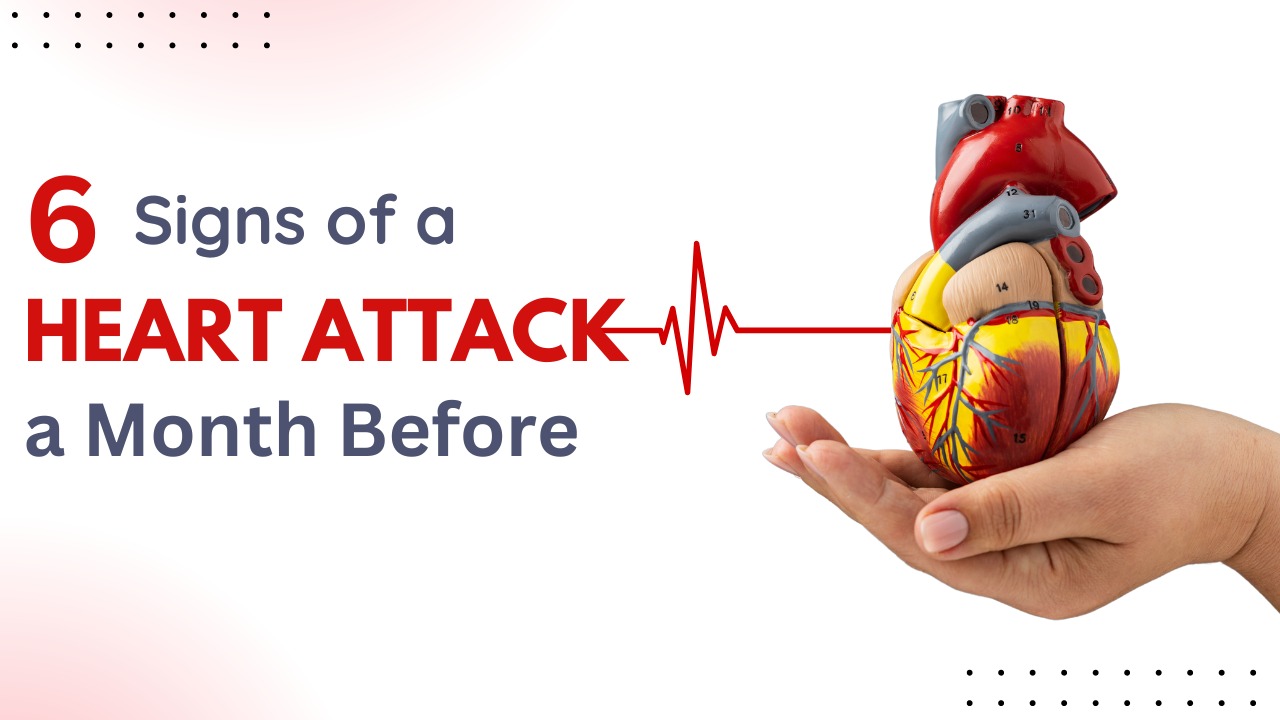
6 Signs of a Heart Attack a Month Before
Signs of a Heart Attack
Heart attack and other heart disease are the top cause of death nowadays. Unlike what movies might show, heart attacks don’t always come with clear signs. They can occur suddenly or silently, but often there are warning signs that can appear hours, days, or even weeks in advance. Recognizing these signs and symptoms could make the difference in saving your own life or the life of someone you care about.
A Broad Scenario :
Whether we’re stuck in traffic or pushing ourselves at the gym, there are moments when we suddenly feel discomfort in our chest or notice our heartbeat acting up. Sometimes, it’s just a general feeling of not being quite right. In these instances, we might find ourselves pausing and questioning whether we should rush to see a doctor or if what we’re experiencing is just a normal part of life.
Signs of an impending heart attack can be seen a month or more in advance. Commonly reported warning signals include chest discomfort, sleep disturbances, and unusual fatigue. Every year, a significant number of individuals in the United States experience heart attacks, with approximately 805,000 cases reported. Among these cases, about 605,000 individuals have their first heart attack. Research indicates that many individuals exhibit symptoms in the days or months preceding a heart attack.
These early symptoms are termed prodromal symptoms. Recognizing these potential warning signs can prompt you to seek medical assistance promptly, thereby enhancing your chances of a complete recovery. Continue reading to discover more about the symptoms that may emerge in the weeks or months leading up to a heart attack.
Introduction
When it comes to recognizing potential health issues, paying attention to the signs your body sends is crucial. Understanding the signs of a heart attack a month before can be a lifesaver. Here are six key indicators that your heart might be trying to tell you something important, possibly signs of a heart attack a month before.
Symptoms
It’s essential to recognize that symptoms of a heart attack can emerge months before the event. Among these symptoms, unexplained chest pain stands out as one of the most commonly reported warning signs.
In a recent study conducted in 2023, researchers examined 242 individuals who received treatment for a heart attack at a heart center in Pakistan. They found that 41.3% of the participants experienced prodromal symptoms, which are early indicators of a heart attack. These findings align with previous studies, which have reported similar rates ranging from 45% to 59%. Understanding and identifying these symptoms in advance can potentially lead to early intervention, improving the chances of a successful outcome and recovery.
The 6 top signs of a heart attack a month before
Weird Feelings in Chest
One of the most well-known signs of a heart attack a month before is experiencing strange sensations in your chest. If you feel like there’s a heavy weight on your chest or if it feels like someone’s giving it a big squeeze, it’s time to take notice. These discomforts might occur frequently, particularly during activities. Sometimes, these feelings can radiate to other parts of your body, such as your arms, neck, jaw, back, or stomach, these are the Signs of a Heart Attack. Your heart might be sending out distress signals, and it’s essential to pay attention.

Trouble in Breathing
Another important sign of heart attack a month before is difficulty breathing. Breathing should come naturally, but if you find yourself struggling to catch your breath, even with simple tasks like walking or climbing stairs, it could be a warning sign. Your heart might not be keeping up with the demand for oxygen in your body, signs of a heart attack a month before, and your lungs might not be getting enough air. This can happen when your heart isn’t functioning as efficiently as it should.

Feeling Super Tired All the Time
Feeling excessively tired is another potential signs of a heart attack a month before. While we all experience fatigue from time to time, feeling exhausted day in and day out, even after getting enough rest, is cause for concern. Your heart works tirelessly to pump blood and oxygen throughout your body, so when it’s not functioning optimally, it can leave you feeling drained and lacking energy.

Getting Dizzy or Feeling Like You Might Faint
Experiencing dizziness or feeling like you might faint can be signs of a heart attack a month before it occurs. When your heart isn’t pumping enough blood to your brain, it can leave you feeling lightheaded or unsteady on your feet. These sensations might occur frequently, especially when you stand up too quickly. It’s your body’s way of telling you that something isn’t quite right with your heart.

Heart Ache (major signs of a heart attack)
Heart palpitations or irregular heartbeats can be signs of a heart attack a month before it happens. If your heart feels like it’s fluttering, racing, or skipping beats, it might be trying to tell you something. While occasional irregular heartbeats are common and usually harmless, frequent palpitations could be a sign of an underlying heart condition that requires medical attention.

Chest Hurts When You Move
Experiencing chest pain or discomfort during physical activity can be a significant signs of a heart attack a month before it occurs. This type of pain, known as angina, happens when your heart isn’t getting enough oxygen to meet the demands of your body. It’s crucial not to ignore chest pain during exercise, as it could be a warning sign of impending heart trouble.

The Immediate Action
If you notice any of the symptoms mentioned earlier, it’s crucial to take immediate action. Here’s what you should do:
- Call for help: Dial emergency services right away and ask for an ambulance. Don’t delay; getting medical assistance promptly is vital.
- Take aspirin: If you have aspirin available and you’re not allergic to it, chew and swallow one 325-milligram tablet. Aspirin can help prevent blood clotting and improve blood flow to the heart.
- Rest and stay calm: Try to remain calm and rest while waiting for help to arrive. Avoid any strenuous activities that could strain your heart. Sit down, relax, and take slow, deep breaths.
- Provide information: When the emergency medical team arrives, give them as much information as you can about your symptoms, medical history, and any medications you’re taking.
Remember, symptoms of a heart attack can vary and may include chest pain, pressure, discomfort, shortness of breath, nausea, sweating, dizziness, or pain in the arms, back, neck, jaw, or stomach. Take any potential symptoms of a heart attack seriously and seek immediate medical attention.
When should I see a doctor?
Knowing when to seek medical advice is crucial for maintaining good health, especially when it comes to recognizing signs of a heart attack a month before. Rather than waiting for symptoms to worsen, it’s essential to address concerns promptly by consulting with your doctor. Early detection of heart disease allows for the implementation of various lifestyle changes aimed at reducing the risk of further complications.

Adopting a healthy lifestyle, such as consuming a balanced diet rich in fruits and vegetables, engaging in regular exercise (typically around 150 minutes per week for most individuals), maintaining a healthy weight, limiting alcohol intake (if consumed at all), and abstaining from smoking, you can significantly decrease your risk of developing heart-related issues, even if you’ve noticed signs of a heart attack a month before. Taking proactive steps toward your health can lead to long-term benefits and improved overall well-being.
Prevention
Here are some simple ways to lower your chances of having a heart attack:
- Eat well: Choose plenty of fruits, vegetables, whole grains, and lean proteins. Limit saturated fats, trans fats, salt, and sugar.
- Stay active: Aim for at least 30 minutes of moderate exercise most days. Find activities you enjoy, like walking, swimming, or dancing.
- Don’t smoke: If you smoke, quitting is one of the best things you can do for your heart.
- Keep an eye on your numbers: Monitor your blood pressure, cholesterol levels, and blood sugar. Work with your doctor to manage any issues.
- Manage stress: Find healthy ways to cope, like deep breathing, meditation, or talking to a friend.
- Get regular check-ups: Stay on top of your health with regular visits to your doctor. They can help you track your progress and catch any problems early.

By making small changes to your lifestyle, you can greatly reduce your risk of having a heart attack.
Conclusion
Remember, recognizing the signs of a heart attack a month before they happen can be crucial in preventing a more severe cardiac event. If you experience any of these symptoms, especially if they persist or worsen over time, it’s essential to consult a healthcare professional promptly. Taking care of your heart by adopting a heart-healthy lifestyle, including eating well, staying active, managing stress, and avoiding smoking, can also help reduce your risk of experiencing a heart attack. So listen to what your body is telling you and prioritize your heart health.
FAQs
1. What happens 1 month before a heart attack?
2. How can a healthy person get a heart attack?
3. How can I rule out a heart attack at home?
4. What is 1 rule for surviving a heart attack?
5. How to avoid a heart attack?
Also Read:
References :
https://www.ncbi.nlm.nih.gov/pmc/articles/PMC7729488/
https://www.ncbi.nlm.nih.gov/pmc/articles/PMC10176795/
https://www.ncbi.nlm.nih.gov/books/NBK507854/
Disclaimer: 6 Signs of a Heart Attack a Month Before
This article provides general information on potential signs of a heart attack. Symptoms may vary for each individual. Always consult a healthcare professional for an accurate diagnosis and treatment. We are not responsible for any health outcomes or misinterpretations.



